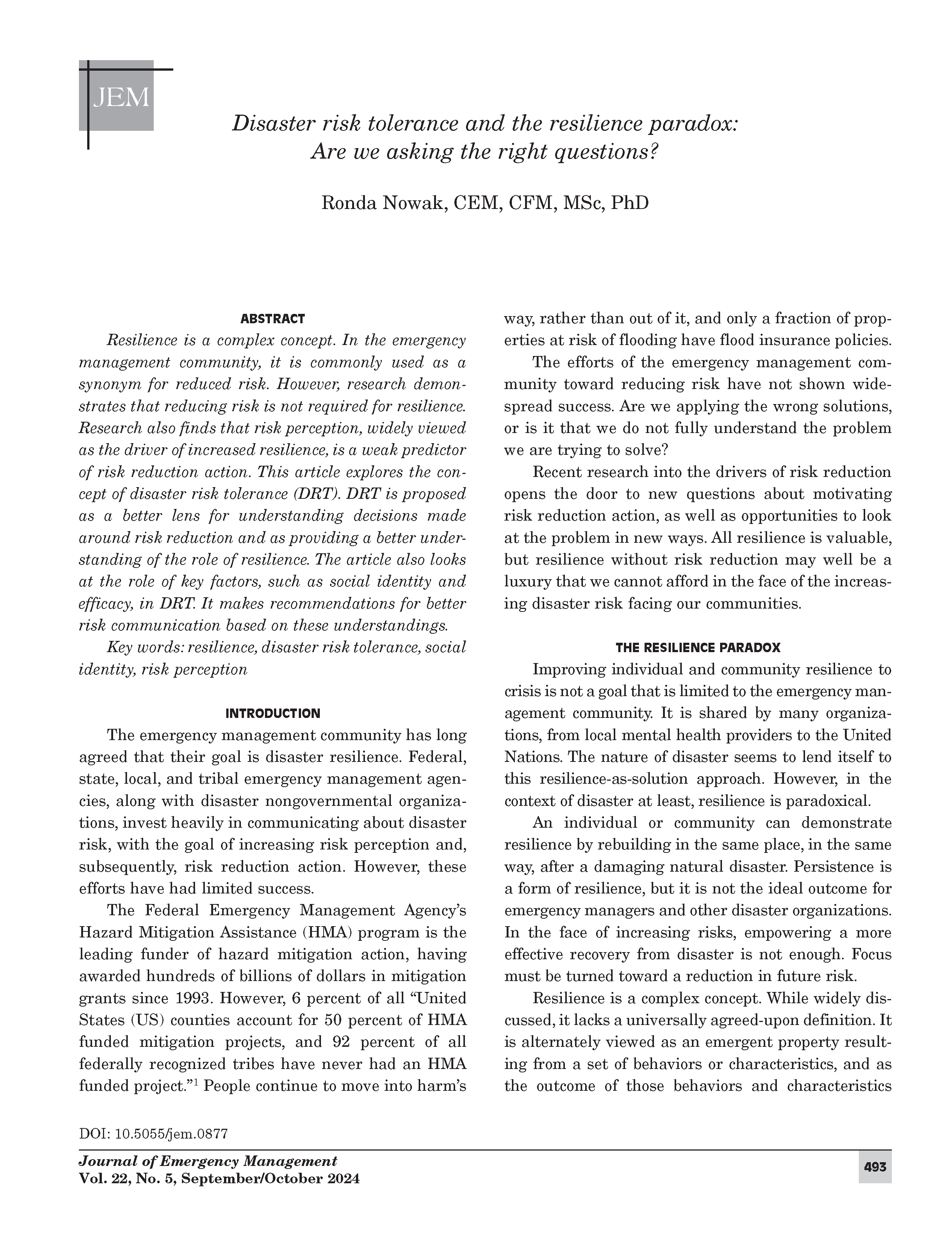Disaster risk tolerance and the resilience paradox: Are we asking the right questions?
DOI:
https://doi.org/10.5055/jem.0877Keywords:
resilience, disaster risk tolerance, social identity, risk perceptionAbstract
Resilience is a complex concept. In the emergency management community, it is commonly used as a synonym for reduced risk. However, research demonstrates that reducing risk is not required for resilience. Research also finds that risk perception, widely viewed as the driver of increased resilience, is a weak predictor of risk reduction action. This article explores the concept of disaster risk tolerance (DRT). DRT is proposed as a better lens for understanding decisions made around risk reduction and as providing a better understanding of the role of resilience. The article also looks at the role of key factors, such as social identity and efficacy, in DRT. It makes recommendations for better risk communication based on these understandings.
References
Federal Emergency Management Agency: Hazard mitigation assistance projects. Washington, DC: Federal Emergency Management Agency, 1993-2021. Available at https://www.fema.gov/openfema-data-page/hazard-mitigation-assistance-projects-v2. Accessed October 20, 2021.
Huber M, Knottnerus JA, Green L, et al.: How should we define health? BMJ. 2011; 343: d4163-d4163. DOI: https://doi.org/10.1136/bmj.d4163
Béné C, Wood RG, Newsham A, et al.: Resilience: New utopia or new tyranny? Reflection about the potentials and limits of the concept of resilience in relation to vulnerability reduction programmes. IDS Working Papers. 2012; 2012(405): 1-61. DOI: https://doi.org/10.1111/j.2040-0209.2012.00405.x
Maguire B, Hagan P: Disasters and communities: Understanding social resilience. Aust J Emerg Manag. 2007; 22(2): 16-20.
Scovell M, McShane C, Smith D, et al.: Personalising the message: Promoting cyclone protection in North Queensland. Aust J Emerg Manag. 2019; 34(4): 48-53.
Bubeck P, Botzen WJW, Aerts JC: A review of risk perceptions and other factors that influence flood mitigation behavior. Risk Anal. 2012; 32(9): 1481-1495. DOI: https://doi.org/10.1111/j.1539-6924.2011.01783.x
Wachinger G, Renn O, Begg C, et al.: The risk perception paradox—Implications for governance and communication of natural hazards. Risk Anal. 2013; 33(6): 1049-1065. DOI: https://doi.org/10.1111/j.1539-6924.2012.01942.x
Barron G, Leider S, Stack J: The effect of safe experience on a warnings’ impact: Sex, drugs, and rock-n-roll. Organ Behav Hum Decis Process. 2008; 106(2): 125-142. DOI: https://doi.org/10.1016/j.obhdp.2007.11.002
Rozario K: The Culture of Calamity: Disaster and the Making of Modern America. Chicago: Chicago University Press, 2007. DOI: https://doi.org/10.7208/chicago/9780226230214.001.0001
Cavallo A, Ireland V: Preparing for complex interdependent risks: A system of systems approach to building disaster resilience. Int J Disaster Risk Reduct. 2014; 1(9): 181-193. DOI: https://doi.org/10.1016/j.ijdrr.2014.05.001
Trentor A: Risk tolerance: A personal perception to staying safe. Holmes murphy. 2021. Available at https://www.holmesmurphy.com/2021/03/risk-tolerance-a-personal-perception-to-staying-safe/. Accessed November 29, 2022.
Newell BR, Rakow T, Yechiam E, et al.: Rare disaster information can increase risk-taking. Nat Clim Change. 2016; 6(2): 158-161. DOI: https://doi.org/10.1038/nclimate2822
Coleman CN, Simon SL, Noska MA, et al.: Disaster preparation: Lessons from Japan. Science. 2011; 332(6036): 1379-1379. DOI: https://doi.org/10.1126/science.332.6036.1379-a
Baron J, Hershey JC, Kunreuther H: Determinants of priority for risk reduction: The role of worry. Risk Anal. 2000; 20(4): 413-428. DOI: https://doi.org/10.1111/0272-4332.204041
Chamlee-Wright E, Storr VH: Social capital as collective narratives and post-disaster community recovery. Sociol Rev. 2011; 59(2): 266-282. DOI: https://doi.org/10.1111/j.1467-954X.2011.02008.x
Cerulo KA: Never Saw It Coming. Chicago: University of Chicago Press, 2006. DOI: https://doi.org/10.7208/chicago/9780226100296.001.0001
Willis KF, Natalier K, Revie M: Understanding risk, choice and amenity in an urban area at risk of flooding. Hous Stud. 2011; 26(2): 225-239. DOI: https://doi.org/10.1080/02673037.2011.549215
Chiang SL: A village called versailles. New Day Films, 2009. 19. Leong KJ, Airriess CA, Li W, et al.: Resilient history and the rebuilding of a community: The Vietnamese American community in New Orleans east. J Am Hist. 2007; 94(3): 770-779. DOI: https://doi.org/10.2307/25095138
Cutter SL, Burton CG, Emrich CT: Disaster resilience indicators for benchmarking baseline conditions. J Homel Secur Emerg. 2010; 7(1): 1-22. DOI: https://doi.org/10.2202/1547-7355.1732
Liu A: Five years later: Lessons learned, progress made, and work remaining from Hurricane Katrina: Hearings before the ad hoc subcommittee on disaster recovery. Senate, 111th Congress. 2011. Available at https://www.govinfo.gov/content/pkg/CHRG-111shrg63829/html/CHRG-111shrg63829.htm. Accessed May 14, 2023.

Published
How to Cite
Issue
Section
License
Copyright 2007-2025, Weston Medical Publishing, LLC and Journal of Emergency Management. All Rights Reserved.





